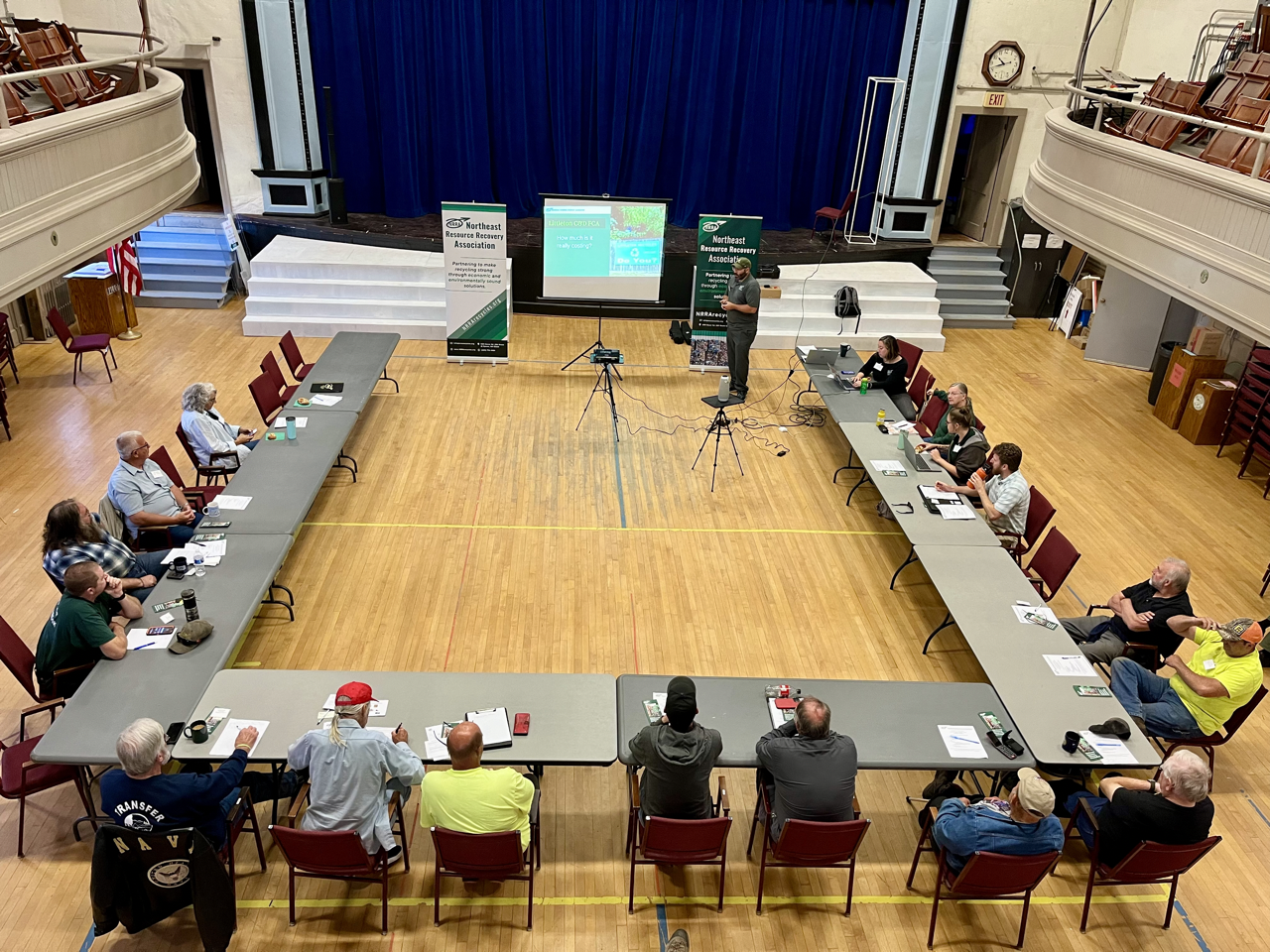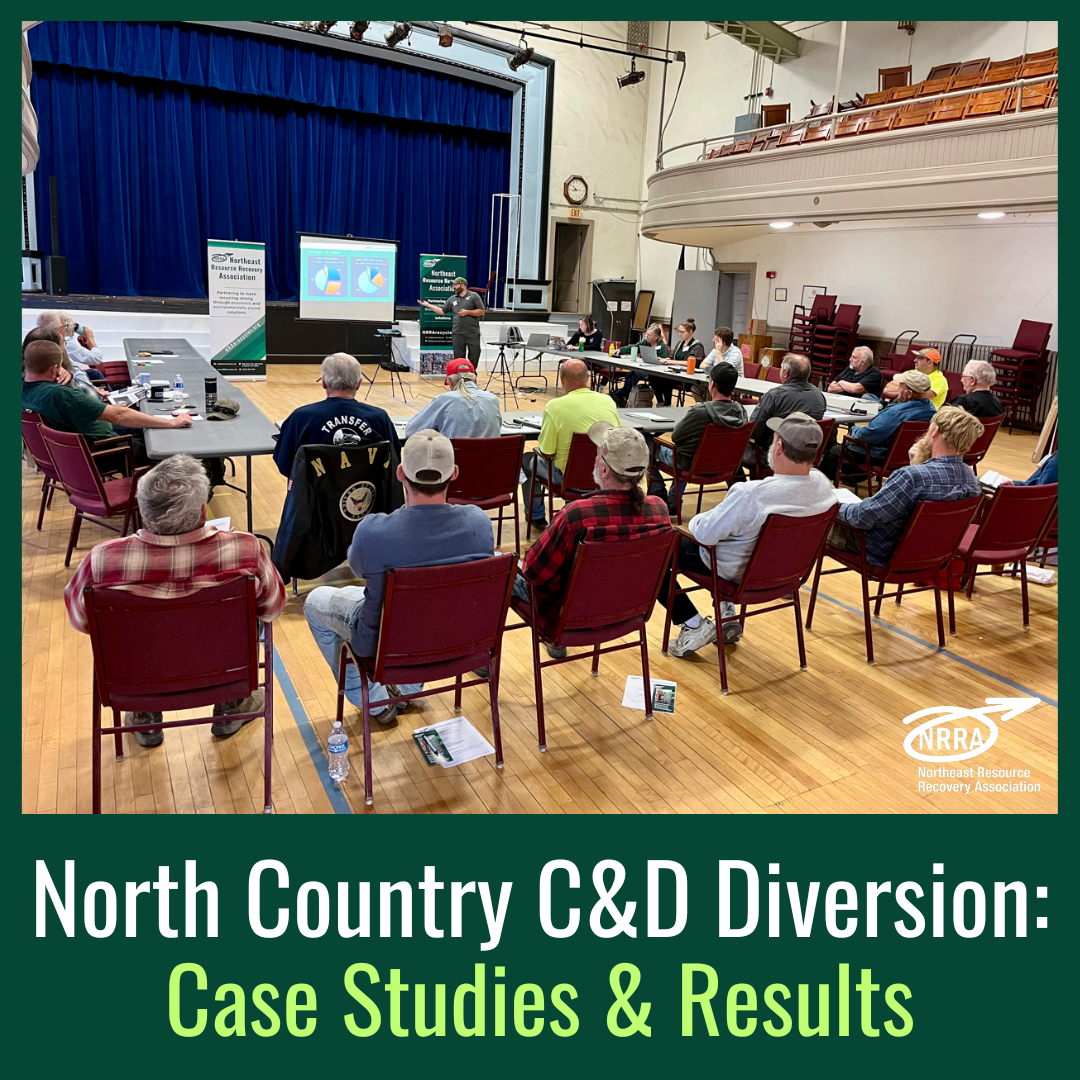Final North Country C&D Diversion Summit and MOM Meeting Recap
For the past couple of years, NRRA has been working through two back-to-back EPA Healthy Communities grants to raise the importance of and tackle the problem of construction and demolition debris (C&D) in the North Country of New Hampshire. According to the most recent EPA data, there was twice as much C&D generated than municipal solid waste (MSW)! However, rural communities like those found in the North Country, tend to not generate enough recycled material to make it worthwhile to transport those materials long distances to manufacturers who could reuse or recycle the material. Because it is so costly to bring heavy C&D so far, nearly all the estimated C&D generated by Coös County communities is landfilled.
But there is also a financial cost to landfilling this material. In 2021, the North Country landfilled 4,500 tons of C&D. Assuming an average cost of $85 per ton to tip C&D at nearby landfills, such disposal is costing North Country communities $382,500 annually, not including transportation costs.
In 2022-2023, NRRA focused first on identifying the problem and exploring how C&D could be better managed at individual facilities in Coös County - a subset of the North Country. In 2023-2024, we built upon this groundwork exploring options beyond individual facilities that could potentially help decrease or divert C&D and other bulky waste (like furniture) away from facilities and landfills. Topics included deconstruction, the role of full cost accounting when setting C&D fees, the feasibility of moving materials on a backhaul, and partnership opportunities for common C&D and bulky items like clean wood, windows/doors, and mattresses.
 The final summit held earlier in September brought the final pieces together with presentations of several case studies led by NRRA's Member Services Director, Brian Patnoe. The hybrid event - online and in person - opened with an NRRA Member Operations and Marketing (MOM) meeting. These monthly meetings are usually held in the NRRA office in Epsom, NH, so having an in-person opportunity in the North Country was an additional benefit to the operators. This MOM meeting covered the monthly Market Report (available to NRRA Voting Members only), updated facility signs now available through NH the Beautiful, and an update from the NH Department of Environmental Services.
The final summit held earlier in September brought the final pieces together with presentations of several case studies led by NRRA's Member Services Director, Brian Patnoe. The hybrid event - online and in person - opened with an NRRA Member Operations and Marketing (MOM) meeting. These monthly meetings are usually held in the NRRA office in Epsom, NH, so having an in-person opportunity in the North Country was an additional benefit to the operators. This MOM meeting covered the monthly Market Report (available to NRRA Voting Members only), updated facility signs now available through NH the Beautiful, and an update from the NH Department of Environmental Services.
Following the MOM Meeting, operators participated in a final Summit roundtable. Brian shared results from the Littleton Transfer Station C&D Full Cost Accounting experience and ways in which the town can now make more informed decisions on the fees and services related to managing C&D at their facility. Participants also learned about Casella's new Mattress Recycling Partnership program that is being piloted at the Littleton transfer station, which allows several North Country communities to divert mattresses from their waste stream to be recycled with no tipping or transportation charge through the end of 2024. Finally, Brian shared the results of the C&D and Bulky Waste Diversion pilot program (now ongoing program) at the Littleton facility, where clean wood and pallets, reusable C&D like windows and doors, and bulky items like furniture and pails were diverted from the waste stream and offered to the community for free for reuse.
The positive economic and environmental impacts were most clearly seen through the Littleton Diversion pilot program which, based on its success, the Town of Littleton plans to continue. Assuming the results for this pilot program period were extended through an entire year, Littleton could expect to divert approximately 13,670 pounds of C&D, save $1,060 in avoided transportation and tipping fees, and avoid 7,690 pounds of greenhouse gas emissions. If the town decided to create dry storage, such as by building a shed, these numbers could increase substantially.
While the North Country C&D Diversion 2.0 project may be complete, the pilot programs and lessons remain. Littleton is continuing their mattress, C&D and bulky waste diversion and more North Country communities reached out to NRRA following the Summit for further information on several aspects of the project, including full cost accounting.
While we were not able to solve the problem of C&D diversion in the North Country - a multifaceted issue we knew at the outset would be a challenge - NRRA was able to highlight the unique challenges rural communities face, as well as local steps they can take to help decrease or divert some of that waste.
This project has been funded wholly or in part by the United States Environmental Protection Agency under assistance agreement 00A01024 to Northeast Resource Recovery Association. The contents of this document do not necessarily reflect the views and policies of the EPA.
